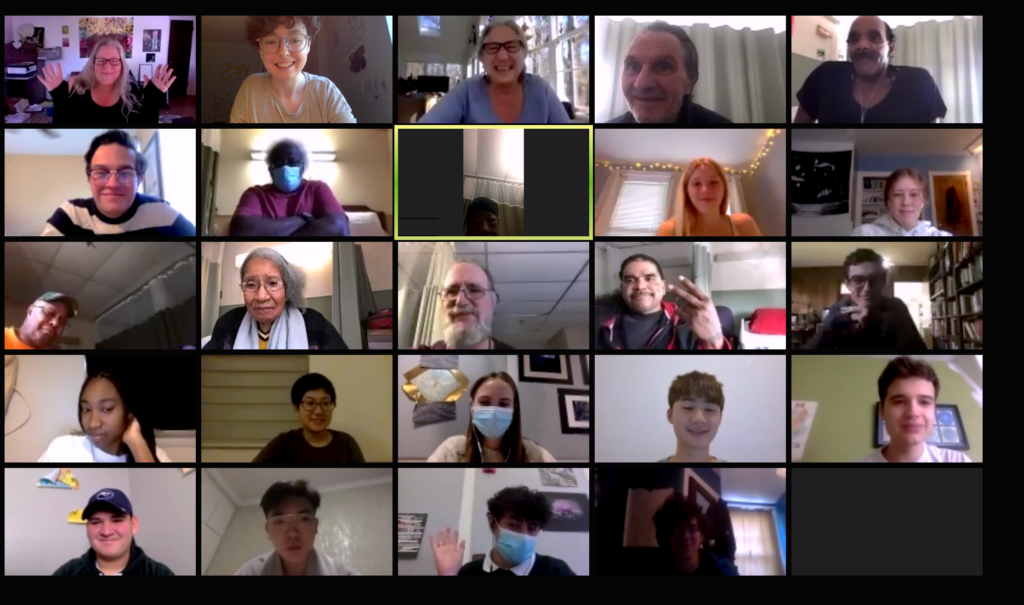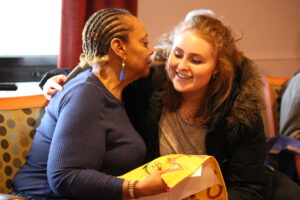
As I look at the eight nursing home residents who have consented to meet with me on Zoom to learn about a volunteer program I run that connects high school students to older folks, I notice that one gentleman has his arms crossed tightly on his chest. I know some basic facts about each of them, and I see that it’s Joe (67, white, religious Christian) who is looking at me a bit suspiciously.
I’m a little worried about how the program is going to work this year, since it has occurred in person at the nursing homes for the past three years. The residents are clearly anxious about the technology, but we’ve decided to go ahead, hoping for the best. I begin by explaining that the students will be helping them each write a story about their lives. I say, “Young people need you, you have lived lives, you have something to tell them. The students will be asking you to tell them a story from your life, to share some of your hard-earned wisdom with them.” I tell the parable of “The Fig Tree” in which a very old man is planting fig trees and who, when challenged by an emperor as to why he is doing this when he will never see the fruits of his labors, the old man responds: “I am not planting these trees for me but for future generations”. I am inviting them, the nursing home participants, to plant some fig trees for the future, some seeds of wisdom.
Joe’s expression loosens a bit, his arms still clutching, but somewhat more loosely at the moment. I ask if there are questions and when he finally figures out how to unmute the zoom he asks something about timing. I congratulate him on his newly gained un-muting skills and he smiles, briefly. His brow softens.
I am very conscious throughout the meeting about repeating over and over that the students, high school seniors in a memoir writing class at Abington Friends School, will be able to help them with the technology. “After all”, I say, “they were all born with smartphones in their hands.” When they meet with the students, our “elders,” as we respectfully call them, will be in private conversations in breakout rooms. I assure them they will find some kernel of wisdom to share with the young people and I give them an example from my own life.

I tell them, “My mother, who had grown up extremely poor and later always wanted to be seen as fashionable and elegant, was always trying to lose ten pounds to fit into the perfect dress. On her deathbed from cancer, she told me with great passion, ‘Tell all your friends not to waste their time trying to lose that ten pounds, to love themselves as they are, and not to spend their lives trying to look like you think you’re supposed to.’ So that’s the message from my mom,” I tell the eight elders gathered on the screen, “and you will find yours.”
I can see out of the corner of my eye that Joe’s arms are at his sides now. I go on to explain that other quite miraculous things have happened because of this program. Unexpected connections were made, new understandings created among those who live together at the nursing homes. The sharing of our stories can make a difference. One year a trans woman in the community who had always been ostracized by her fellow residents listened while the student read her memoir and message when we all gathered for our final meeting and celebration. Upon the conclusion of her story she called out, “Now I am somebody.” After the event was over, some of the women in the community, who had ignored her previously, invited her to join their women’s group. “This might never have happened,” I say.
I can see that Joe has moved now; he’s been standing the whole time, but now his arms are resting on the table in front of him where the iPad is and he is leaning on the table. He’s leaning in.
I conclude with this message: “We tell the kids you need them, the connection and the contact. But really they need you even more. Being a teenager is tough. Being a teenager now is tougher still, in Covid times, in politically stressful times, in economically insecure times. They need to hear from people who have lived through hard things and survived and who can teach them important lessons.” As I speak, I’m aware of the change in my formerly reluctant, suspicious Joe who is now clearly engaged and feeling “it”–feeling purpose, something to do, somewhere to matter, agency, dignity.
At my organization, Mending Spirit, Art for Healing, we often speak about casting one pebble into one pond. We don’t pretend to know exactly how the resulting ripples, the energy that pushes forward, will effect change. We do know that it does–that even the transformation in Joe in that 45 minutes on Zoom preparing for a memoir-writing project called “Fig Tree Stories: Elder tales” ©2017Mending Spirit, changed something for him for the better.
Postscript: We have our first meeting between the students and elders on Zoom and this time Joe greets me with a smile and a wave and off he goes into the miraculous thing called a breakout room. Little does he know he will meet a young man who worked on the Democratic campaign for president and who knows that Joe is a veteran marine and a Republican. When the student returns to the main screen and sees me and his teacher, he exclaims, “That was amazing, I wasn’t expecting it to be that cool!” All I can say is it does not get any better than this.

Awesome! So needed during this time! I’d love to see this program keep going. How can I donate to Mending Spirit?
http://www.mendingspirit.com ! Thank you!!